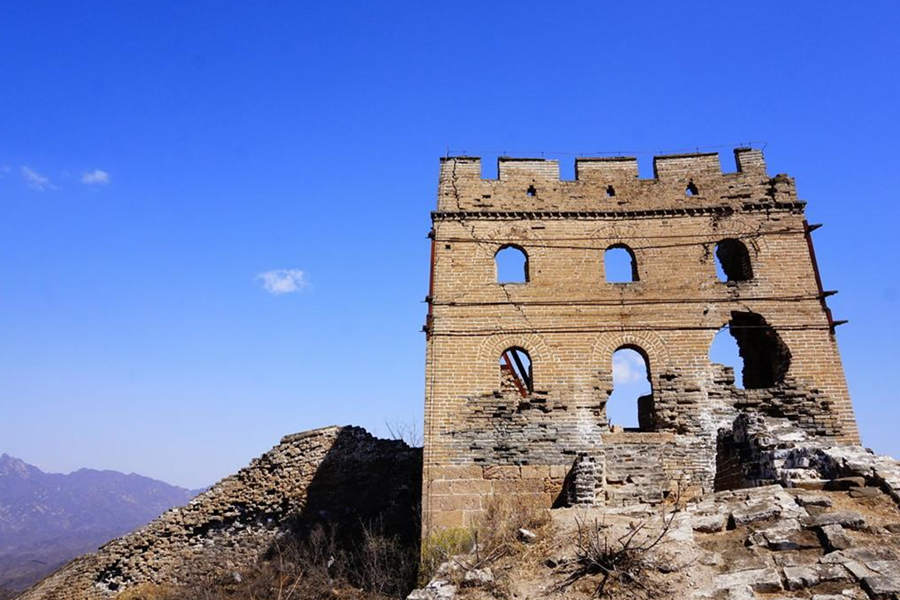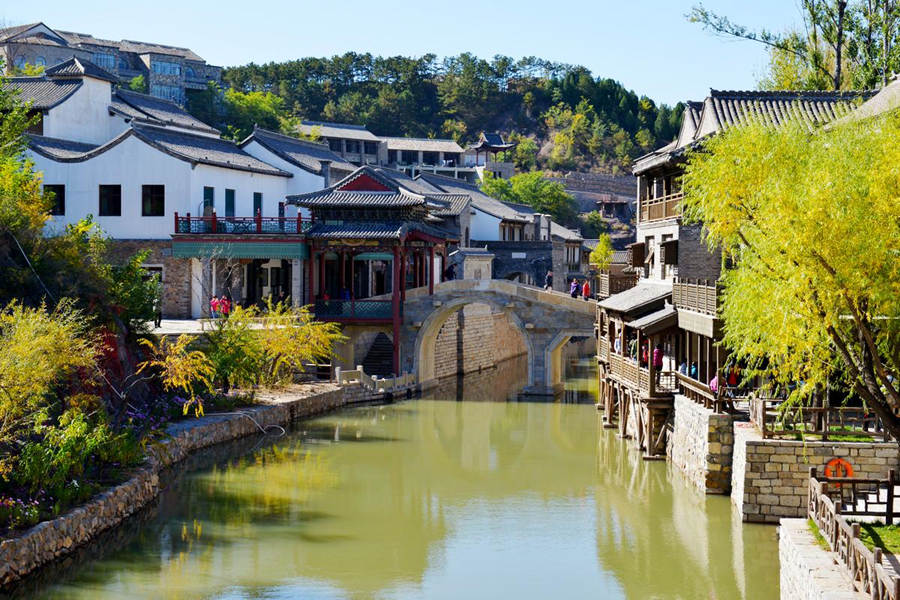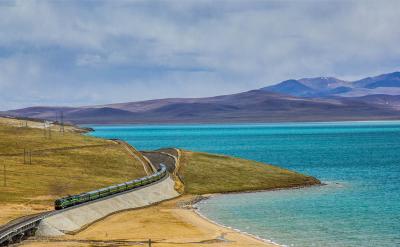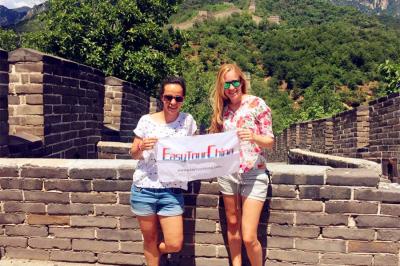Gubeikou Great Wall
Located 120 kilometres southeast of Beijing, The Gubeikou Great Wall is the most complete Great Wall System in history, and remained authentic and wild. It consists of the Northern Qi Great Wall and the Ming Great Wall together.
In the broad sense, it is composed of four sections: Wohushan, Panlongshan, Jinshanling, and Simatai. But in the narrow sense and to visitors, it is composed of Wohushan and Panlongshan.
The Gubeikou section is the Great Wall fortress between Shanhaiguan and Juyong Pass, and it is the throat from Liaodong Plain and Inner Mongolia to the Central Plains Empire, so it has always been a battlefield. In Chinese history, especially in the five dynasties of Liao, Jin, Yuan, Ming and Qing, battles for the Gubeikou Great Wall have never stopped.

Gubeikou Great Wall Facts
The History of Gubeikou Great Wall
From the Western Zhou Dynasty to the Spring and Autumn Period and the Warring States Period, the armies of various dynasties built piers and fortifications at Gubeikou. In order to prevent the Huns from invading the northern part of the country and disturbing the borders, Emperor Wu of Han Dynasty ordered the garrison to start building a city and laying down troops at the Gubeikou. Countless wars have been fought with the capture of Gubeikou as the first step.
However, there was no Wall at Gubeikou in the early period. The Great Wall of the Warring States period and the Qin and Han Dynasties passed far north of Gubeikou.
In A.D 555, a Great Wall of more than 1,500 kilometers was built from Western River (now Yulin River in Shanxi Province) to Shanhaiguan Pass, Gubeikou is the key fortification point of this section of the Great Wall.
In the 11th year of Hongwu in the Ming Dynasty (1378), Gubeikou Great Wall was extended and enhanced with more pass gates and beacon towers.
The last construction took place in 1569. At that time, more than 600 kilometers of the Great Wall under the jurisdiction of Jizhen County was carefully planned and personally supervised by the famous general Qi Jiguang. In ten years, it became a strong defence line with high walls, piers and platforms, and beacon towers. When Qi Jiguang repaired the Gubeikou Great Wall, he not only preserved the Northern Qi Great Wall, but also added bricks outside the wall.
The Gubeikou Great Wall has never been reconstructed in modern times, and it is somewhat dilapidated but retains its original beauty.
What to See at Gubeikou Great Wall
The Great Wall of was composed of the Northern Qi Dynasty Line and Ming Dynasty Line. It is a wild Great Wall section and retains its original composition. It is more suitable for people who love history and hiking. Hiking at Gubeikou is moderate, the mountain where the Gubeikou Great Wall is located is not high, while the roads up the mountain are covered with gravels and some sections are dilapidated, it is better to go with companions, and should avoid climbing under bad weather conditions, such as rain and thunderstorms.
There are 143 watchtowers, 14 beacon towers, 16 gateways, 3 water passes, 6 fortresses and 3 barbicans in Gubeikou section with a total length of more than 40 kilometers. Among them, the famous ones are Dahualou beacon tower, Wangjing Tower, Sister Tower, Fairy tower, General Tower, 24-Eye Tower, etc.
![]()
Major Attractions
Double-lined Great Wall
Gubeikou Great Wall was first built during the Northern Qi Dynasty, In the year of 1368, general Xuda was ordered to rebuilt it. The defensive capacity was enhanced by adding more stones on the basis of the Northern Qi Dynasty Great Wall. In the year of 1569, when Qi jiguang repaired the Great Wall in Gubeikou, he retained the great wall of Northern Qi Dynasty and pasted more bricks outside of the wall, forming the famous Double-lined Great Wall in Gubeikou. The famous Dahualou beacon tower and seven famous gateways are still preserved on the Northern Qi Dynasty Great Wall.
General Tower
The General Tower is a two floor watchtower with a height of 10 meters. There are three arrow windows in the east and west, four arrow windows in the north and south, and there is one door in each direction. This tower was once attacked by enemy’s fire, and the crenels on the top have been completely destroyed by the gunfire. In the famous Great Wall War that against Japan, the fiercest battle between the enemy and us was happened at the General Tower.
24-Eye Tower
24-Eye Tower is the end of the Great Wall of Gubeikou section, it is the landmark building in Panlongshan section of Gubeikou Great Wall, and echoes the famous General Tower in the war. The 24-Eye Tower has three floors, the first and second floors have three arrow windows on each side, and the top floor is surrounded by crenels. It was named because there were 24 arrow windows on all sides, but the northwest part of it had been collapsed, and only the east and southwest wall were still standing there. Because of its important strategic position, the tower is very tall and unique, even a little bit of the feeling of ancient Roman coliseum. It is said that it used to be Qi Jiguang's office in Gubeikou.
Gubei Water Town
Gubei Water Town is located in Gubeikou town, leaning against the famous Simatai Great Wall, and only 10 kilometers driving distance from the entrance of Gubeikou Great Wall. Regarded as 'Wuzhen in Beijing', Gubei Water Town boasts a combination of mountains, water and ancient villages. The architectural features of the whole town are typical northern architectural style. Most buildings are reconstructed in the traditional courtyard style. The renovation of this 1000-year-old town has been beautifully done. Visitors now can combine the Great Wall of China and water town for an innovative Beijing trip.

Gubeikou Great Wall Hiking & Camping
For those looking for Great Wall of China hiking routes, Gubeikou section offers trails suitable for hikers of different fitness levels:
Hiking Route #1: Gubeikou Town - Panglong Mountain
From Gubeikou Town, climb up to the General's Tower, overlooking the Chaohe Gorge. This trail preserves the rammed earth walls of the original Great Wall and is perfect for photography.
Hiking Route #2: Panglong Mountain - Jinshanling
Hike through the famous Twenty-four Eyes Tower, the largest enemy tower of the Ming Dynasty. After restoration, the east and west sections of the Jinshanling Great Wall provide a stark contrast. Jinshanling is also the best Great Wall for hiking and photography.
Hiking Route #3: Wild Great Wall of Crouching Tiger Mountain
- Suitable for: Experienced Hikers
- Distance: about 8 kilometers
- Difficulty: Challenging
- Time needed: 5-6 hours
The Great Wall of the Northern Qi Dynasty was built mainly of stone. During the Ming Dynasty, eight enemy towers were built on top of it, giving it the name Eight Building Towers. Climb to the top to see the Miyun Reservoir and look for the twin towers of the Sisters' Tower. Due to the partially collapsed section, it is only recommended for those with outdoor experience or with a local Great Wall guide.
Gubeikou Great Wall Camping
Is it Legal or illegal to camp on the Great Wall at Gubeikou section? Camping is allowed in Gubeikou except for some Restricted Areas. You can also choose to camp at the Starry Sky Campsite in Gubeishui Town, 3km from the Great Wall.
>> Recommended China tours to Gubeikou Great Wall:
Best Time to Visit Gubeikou Great Wall
Generally speaking, it is available to travel Gubeikou Great Wall all the year around. In different seasons, you can savor different beauty of Gubeikou. The best time to Gubeikou Great Wall would be April, May, September, and October when the temperature is comfortable and the scenery is delightful. It is always hot in summer and cold in winter. It is worth to mention here that a lively and large-scale temple fair is held at the King Medicine Temple on each September 14th of Chinese lunar calendar. It will be a very special experience to take part in a Temple Fair during your Beijing tour.
>> Learn more about Best Time to Go to Great Wall of China
How to Get to Gubeikou Great Wall from Beijing
1. Bus: Take tourist bus from from Dongzhimen Wai Station to Gubei Water Town (the departure time are: 09:00, 12:00, 15:30, there is an extra bus departs on 14:00 on weekend), transfer to bus Mi 25 to Er Zhai Cun Kou, then walk about 1.4 km to the entrance.
2. Private car: Easy Tour China can arrange private China Great Wall tours to Gubeikou Great Wall which will be more comfortable and convenient.
More Attractions in Beijing


